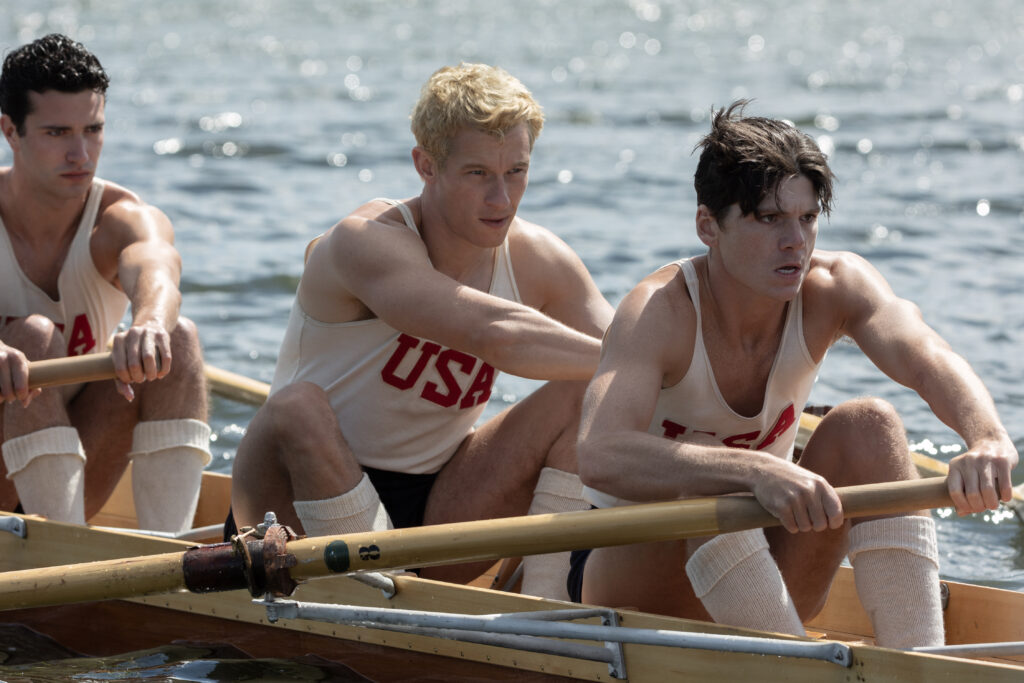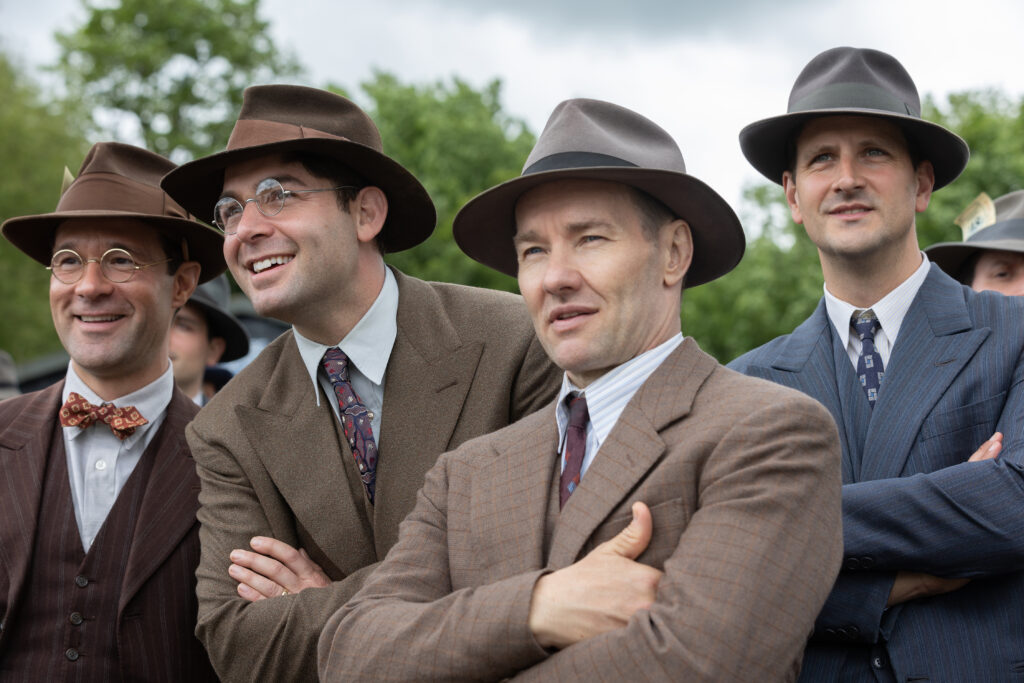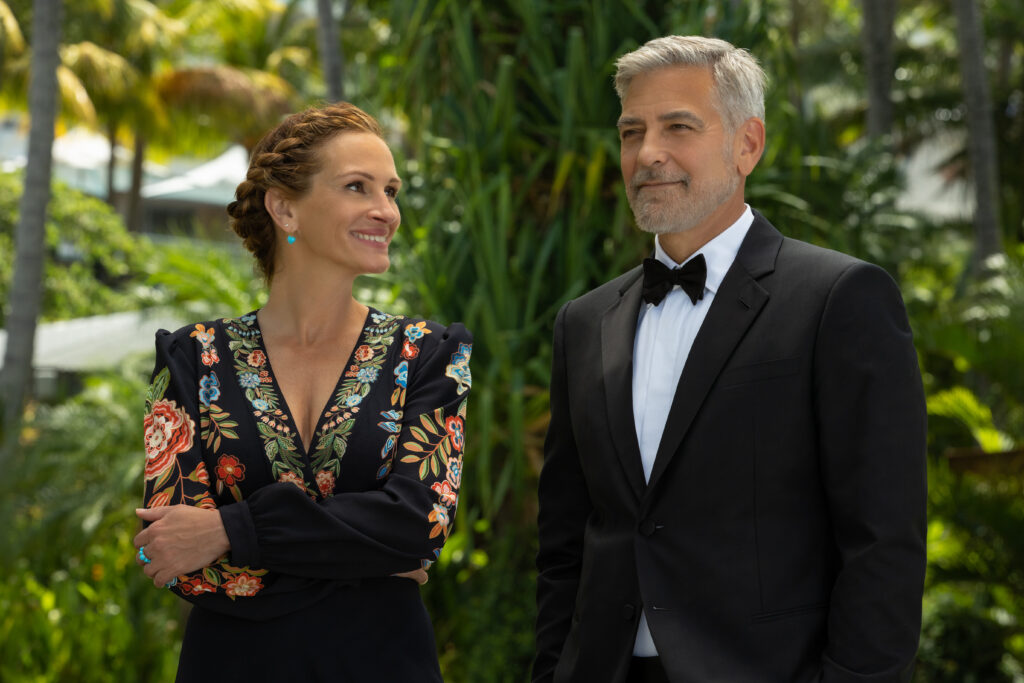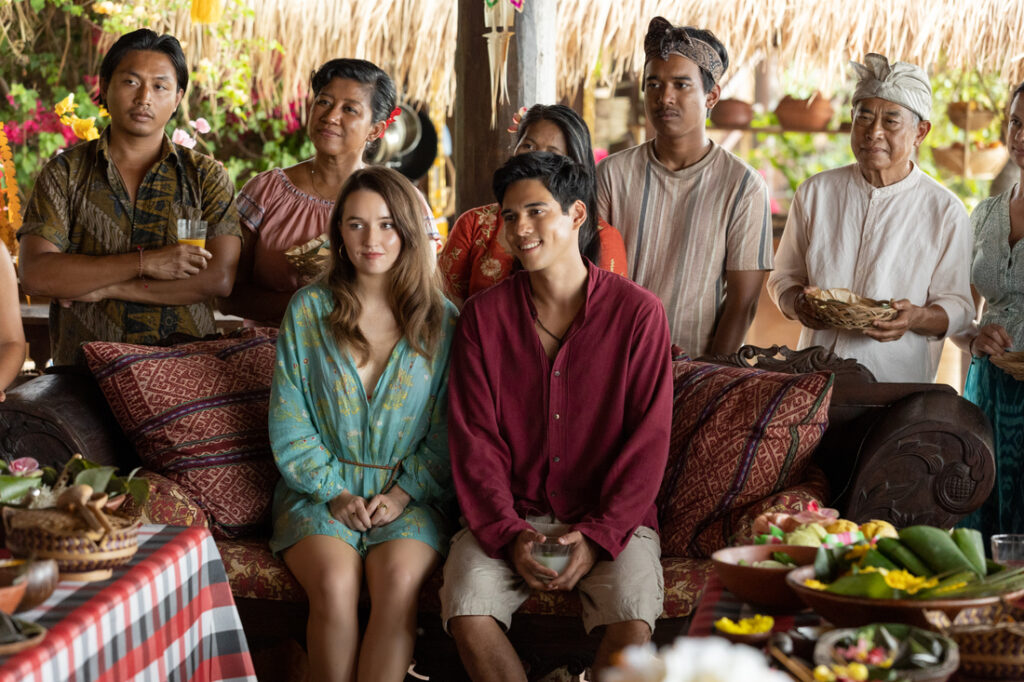December 15, 2023
by Carla Hay

Directed by George Clooney
Culture Representation: Taking place in 1936, in the United States and in Germany, the dramatic film “The Boys in the Boat” (based on the non-fiction book of the same name) features an all-white cast of characters representing the working-class, middle-class and wealthy.
Culture Clash: Against the odds, the University of Washington junior varsity rowing team becomes a winning team in the United States, and competes in the 1936 Olympics against the Nazi German team that is expected to win the gold medal.
Culture Audience: “The Boys in the Boat” will appeal primarily to people who are fans of filmmaker George Clooney and old-fashioned sports movies that are conventional to a fault.

“The Boys in the Boat” is the cinematic equivalent of stale and lukewarm comfort food for people who like formulaic underdog sports movies with no surprises. The acting performances are competent, but the screenplay and direction have too many dull clichés. Even if you didn’t know the true story on which this movie is based, it’s very easy to know how the movie is going to end within the first 15 minutes of watching the film.
Directed by George Clooney and written by Mark L. Smith, “The Boys in the Boat” is based on Daniel James Brown’s 2013 non-fiction book of the same name. The movie waters down, oversimplifies, and omits many interesting facts from this true story. The end results are a plodding and monotonous catalogue-type film, where most of the characters are either stereotypes or utterly forgettable.
“The Boys in the Boat” movie takes place in 1936, when the United States was in the midst of the Great Depression. In the city of Seattle, a financially struggling, working-class student named Joe Rantz (played by Callum Turner) is on the verge of being removed from enrollment at the University of Washington because he hasn’t been able to pay his tuition. In the beginning of the movie, Joe is told by a university official that Joe has two weeks to pay the tuition that he owes, or else he can no longer be enrolled in the university.
As luck would have it in a movie like “The Boys in the Boat,” Joe finds out that he can make the money that he needs in a short period of time if he gets chosen for the university’s junior varsity rowing team: the Washington Huskies. Only eight students will be chosen from a group of about 100 students who have tried out for these coveted slots. The team’s head coach Al Ulbrickson (played by Joel Edgerton) is a typical no-nonsense sports leader who warns everyone that being on this rowing team is physical torture, and most of the people who want to be on the team don’t have what it takes to succeed in rowing.
It’s not spoiler information to say that Joe makes the team, because the movie’s trailer and other marketing materials already reveal who’s on the team. The other students who are chosen are Don Hume (played by Jack Mulhern), Shorty Hunt (played by Bruce Herbelin-Earle), Jim McMillin (played by Wil Coban), Chuck Day (played by Thomas Elms), Johnny White (played by Thomas Stephen Varey) and Gordy Adam (played by Joel Phillimore). Nathan Coy (played by Tom Claxton) is the team’s reserve member. Glenn Morry (played by Frankie Fox) is the team’s coxswain.
Joe’s love interest is Joyce Simdars (played by Hadley Robinson), who was his crush in the fourth grade, but she moved away with her family and hasn’t seen Joe in years. But lo and behold, there she is at the University of Washington as a student. And when Joyce and Joe see each other again, she immediately reminds a slightly embarrassed Joe about the love note that he gave to her when they were children. Joyce, who comes from an affluent family, says she mainly enrolled in the university to get away from her religious mother. The romance between Joe and Joyce goes exactly the way you think it’s going to go in this type of movie.
Joe’s family background is reduced to a soundbite, in a scene where he tells the team’s boat maker George Pocock (played by Peter Guinness) that he’s been on his own since he was 14 years old. The character of George is a sports movie stereotype of a wise elder who’s not the main coach but who gives mentor advice to troubled athletes. Joe’s mother died when Joe was about 4 years old. His father Harry Rantz left to find work when Joe was in high school, and he didn’t come back. Joe briefly mentions he has a stepmother who had two young sons in her care. “It worked out best for everybody,” Joe says of his fractured family.
Really? Because in real life, things were much more difficult for Joe than how it’s described in the movie. In real life, Joe had an older brother named Fred, who is completely erased from the story. And although it’s true that Joe’s father Harry left, what the movie doesn’t mention is that Harry took his wife and stepsons with him. According to “The Boys in the Boat” book, Joe’s stepmother disliked Joe and insisted to Harry that Joe had to be left behind to fend for himself.
This traumatic abandonment is barely explored in the movie, which failed to give a deeper understanding of Joe’s intense motivation to succeed on the rowing team, other than the need to get money for tuition. Instead, the movie turns this parental abandonment into a glib line that Joe says about things working out for the best. You can almost do a countdown to the scene when deadbeat dad Harry (played by Alec Newman) shows up again at a certain point in Joe’s life.
“The Boys in the Boat” makes the same mistake that mediocre and bad movies about sports teams tend to make: Instead of giving distinct and memorable personalities to several of the team members, only one or two team members get this type of showcase. But even in this area, “The Boys in the Boat” falls short with trite dialogue for the two team members who get the most screen time: Joe and Don. Joe is in the team’s seventh boat position to set the pace, while Don is in the eighth position as the stroke anchor.
Joe is a typical star of a team in a sports underdog movie: He’s talented but he had to overcome a lot of obstacles to get to where he is. Joe is a good guy who’s a little bit introverted. He’s very shy when it comes to dating, which is supposed to make him look endearing to the viewers of “The Boys in the Boat.”
In these types of generic sports movies, the protagonist can’t be completely confident or completely privileged, or else the protagonist won’t be “relatable.” But “The Boys in the Boat” filmmakers don’t want to make Joe have too many hardships, or else that won’t make him “relatable” either. Even when Joe experiences a “will he or won’t he stay on the team” moment, there’s no real gravitas, because this moment comes and goes so quickly in the movie.
Every star on the team has a rival on the same team, who could either become a close ally or a bitter enemy. In this case, Joe’s competition for being the team’s biggest standout is Don, who’s even more socially awkward than Joe when it comes to dating. At least Joe can initiate a conversation with a potential love interest. In a scene taking place at a school dance, Don is afraid to look at and talk to a woman who looks at him flirtatiously when she’s sitting about six feet away from him.
Don’s rowing teammates are at the same dance. They know that Don is a talented piano player. And so, when they see that Don is having a hard time connecting with any women at this dance, what do his teammates do? They get up on stage and tell a reluctant Don that he has to play piano for the crowd, with the ulterior motive being that this performance will impress any women who could be Don’s love interest.
Don starts off playing bashfully, but he quickly improves and wins over the people in the audience, who respond with loud cheering. It gives Don the confidence he needs when that woman who was looking at him earlier has an inevitable conversation with him at the dance. Yes, it’s that kind of movie.
The coaches in the movie are also fairly predictable. Coach Ulbrickson is typically gruff and tough in training and during rowing matches, but he shows a compassionate side when necessary. His two assistant coaches—Coach Tom Bolles (played by James Wolk) and Coach Brown (played by Dominic Tighe)—are mostly inconsequential characters. Coach Bolles is the more upbeat counterpart to frequently scowling Coach Ulbrickson, while Coach Brown is written with an almost completely blank personality.
Seattle Post-Intelligencer sports journalist Royal Brougham (played by Chris Diamantopoulos) shows up occasionally to give the coaches information on how rival teams are doing. The movie becomes a checklist of stepping stones for the team, until the Huskies reach their ultimate challenge: competing in the 1936 Olympics against the frontrunner rowing team from Nazi-controlled Germany. There is no suspense, because there would be no “Boys in the Boat” movie if the villain team won.
Along the way, viewers of “The Boys in the Boat” are constantly pounded over the head with corny dialogue saying that because the University of Washington’s junior varsity team members come from working-class backgrounds, they “deserve” to win more than any affluent and privileged students from opposing teams. This heavy-handed messaging is especially hammered into the Pacific Coast Regatta scenes, where the Washington Huskies face off against the better-funded and more experienced Cal Bears from the University of California at Berkeley. It’s reverse snobbery that’s kind of obnoxious and hypocritical, considering that “The Boys in the Boat” director/producer Clooney comes from the same type of affluent and privileged family background that is frequently insulted in this hokey movie.
And therein lies what is ultimately the undoing of “The Boys in the Boat.” By trying too hard to look “relatable” by appealing to “working-class/common-person” sensibilities, everything is “dumbed down” and ends up looking too phony in the movie. “The Boys in the Boat” needed to give audience members more credit in being able to handle the grittier and more complex nuances of these real rowing team members, instead of forcing these athletes into looking like “too good to be true” heroes with cardboard personalities.
Amazon MGM Studios will release “The Boys in the Boat” in U.S. cinemas on December 25, 2023.




